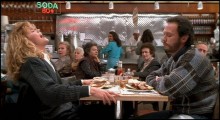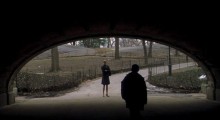Authors — Zachary Wigon
-
The Silent Treatment: Director Miroslav Slaboshpitsky on The Tribe

The word “bravura” gets thrown around all too often in the realm of ambitious filmmaking (perhaps in arts criticism in general?), but there is seemingly no other word to describe the colossal craft on display in Ukrainian helmer Miroslav Slaboshpitsky’s Cannes 2014-premiering debut feature, The Tribe. The film’s narrative — which hews somewhat to the genre obligations of a Western, as Slaboshpitsky points out — concerns a young man, Sergey (Grigoriy Fesenko), who is a newcomer at a deaf boarding school in Ukraine. No sooner has Sergey arrived than he realizes that the school is run by its administration in […]
by Zachary Wigon on Apr 28, 2015 -
Somewhere I’m Not: An Interview with Ignatiy Vishnevetsky

I saw a number of startlingly good films in 2014, but nothing shook me quite like a picture I saw at BAMcinemaFest this past summer. The film was Ellie Lumme, Ignatiy Vishnevetsky’s debut…debut what, exactly? Clocking in at 42 minutes, the film’s runtime frustrates typical designations – is it a featurette? A quasi-feature? A long short film? Perhaps we should just call it a medium. A medium seems most appropriate, as the film is a ghost story — albeit, as Vishnevetsky has cheekily explained, a ghost story sans ghost. (This description is, in fact, perfectly appropriate, and if you read […]
by Zachary Wigon on Dec 15, 2014 -
How Filmmaker Magazine Helped Me Launch My First Feature, the SXSW-Bound The Heart Machine

Zach Wigon has written a number of provocative, discursive and highly original film essays for Filmmaker over the last couple of years, and now he is making his first feature. In this guest essay, appearing alongside the SXSW-bound film’s Kickstarter campaign, he describes how the interests explored in these pieces dovetailed into a seductive thriller for the NSA age, The Heart Machine. After reading, check out some of Zach’s old pieces for us and consider contributing to his campaign. — SM It all started with Filmmaker Magazine. In the Fall of 2010, I received an email from a producer […]
by Zachary Wigon on Feb 12, 2014 -
Antonio Campos and the Case of the Conscious Camera (A Mystery)

In a moment where American independent cinema seems to be primarily focused with character and regional setting, Antonio Campos stands in stark contrast with his peers. Concerned with intricate problems posed by framing, camera movement and editing, Campos used a formal investigation into the medium to guide him through his debut feature, Afterschool, which is a kind of materialist examination of how reality is affected by the digital representation thereof. With his latest film, Simon Killer, Campos is less concerned with a topical milieu than he is with the mental state of the troubled eponymous individual; in the process of […]
by Zachary Wigon on Apr 4, 2013 -
This Is Different: Cristian Mungiu on Beyond the Hills

Cristian Mungiu’s latest feature, Beyond the Hills, confirms suspicions that were aroused by his previous, the Palme d’Or-winning 4 Months, 3 Weeks and 2 Days. What’s been confirmed is that Mungiu is that rare blend of filmmaker who seems destined to produce first-class auteurist art cinema. Mungiu blends two distinct types of filmmaking into one carefully distilled whole: his films address critically pressing social issues that are irrefutably relevant, but they also are formalist aesthetic works that are very much about the nature of cinema itself. There are plenty of serious filmmakers who tackle either one interest or the other, […]
by Zachary Wigon on Mar 7, 2013 -
They Should Be Grateful: An Interview with Abbas Kiarostami

There is a reassuring softness to the touch of Abbas Kiarostami’s films. At a moment in which so many of cinema’s reigning masters exhibit a violently firm command of their work (Von Trier, Haneke), Kiarostami seems happily inclined to set his viewers free through the gauzy mazes of nuance that make up his cinema, encouraging them to come to their own conclusions. That’s not to say that Kiarostami’s hand isn’t as exacting as that of his perpetual Cannes competitors, but rather, that Kiarostami’s careful grip manifests itself in a carefully light touch. That light touch can be frustrating to those […]
by Zachary Wigon on Feb 13, 2013 -
Going on a Date with the Audience

Something that constantly wins me over is when a movie doesn’t try too hard to thrust its narrative and/or message in my face. We all have seen films that announce, “Here is what the film means! Here is what matters to our protagonist!” in bold-faced, 48-point-type that gauchely screeches across the screen. An example we can all relate to is Paul Haggis’ Crash, which informs us, just in case we didn’t know, that a) RACISM IS BAD; b) some people who seem to be racists aren’t totally terrible; and c) some people who don’t seem to be racist may actually […]
by Zachary Wigon on Dec 27, 2012 -
The Pact: Miguel Gomes on Cinema and Tabu

Part realism and part fantasy, half 35mm and half 16mm, part post-colonial and part colonial, half a swooning love story and half a clear-eyed political assessment, Miguel Gomes’s Tabu functions, as he puts it in this interview, within a structure of oppositions. Simultaneously a rebuke – and vindication – of the concept that “the personal is the political,” Tabu is a carefully constructed film in two halves, each of which comments upon the absences articulated in the other. We start in present-day Portugal, with Pilar (Teresa Madruga), a middle-aged woman who works for an unidentified lefty non-profit. Pilar is of […]
by Zachary Wigon on Dec 26, 2012 -
The Truth in Ambiguity

Editor’s Note: This essay on ambiguous film endings contains spoilers for the film Oslo, August 31. Joachim Trier’s latest feature, the formally inventive and genuinely moving Oslo, August 31, really had me in its grip by the end. The film, which is about one day in the life of a recovering heroin addict, finishes with the protagonist returning to his childhood home, which is empty. Earlier in the film, we’ve seen him buy a whole bunch of heroin, and a relapse – or worse – may be imminent. In the opening of the film, the addict, Anders, attempts to kill […]
by Zachary Wigon on Dec 5, 2012 -
The Toenail of the Curve: Remembering Harris Savides

In what is easily the most informative internet message board thread I’ve ever come across, “birth – Harris Savides,” which was started on Cinematography.com by a young man you may have heard of named Jody Lipes on November 1, 2004, the conversation turns around midway through to the aggressive underexposure used by Savides on Birth (pictured above). One of the forum’s members, who claimed to have worked on Birth, explained that Savides underexposed the film two stops, and then pulled it two additional stops, netting a total underexposure of four stops – which seems to have sent the head of […]
by Zachary Wigon on Oct 12, 2012
